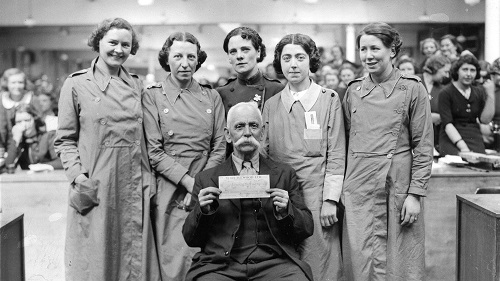Scouse camaraderie remembered at Littlewoods event

Littlewoods is being remembered through the eyes of its legions of workers in a unique showing at the Museum of Liverpool.
World-famous for its football gambling and retail business, the Liverpool company employed 30,000 at its peak, known as ‘Littlewoodies’, the majority women.
The displays, which run for three months, include vintage photographs, letters, coupons, promotional materials and memorabilia. Curated by LJMU, they have a strong focus on the social life of the factory and its legacy in the wider community.
“The stories of sisterhood and camaraderie created friendships which last to this very day,” said organiser Dr Ruth Doughty, head of film studies at LJMU's Screen School.
“The display has been inspired by interviews with scores of former employees and their own personal journeys with Littlewoods. It was a truly unique workplace which was more like an extended family, a huge asset for the city and a model for other companies.”
The showcase is being staged at the Museum of Liverpool at the Pier Head to April 28 with a launch event on 1 February featuring a gathering of ex-employees.
Littlewoods was an iconic brand founded by Sir John Moores and his brother Cecil. From the humble beginnings of the Football Pools in 1923 to the evolution of mail order catalogues and retail stores, Littlewoods became a household name and a national institution.
The Moores Brothers were ahead of their time employing a workforce of mainly women and renowned for looking after their employees; not only did they pay the best wage in Liverpool, but ‘Littlewoodies’ were also treated to day trips and given the chance to join in-house sports teams, choirs and amateur dramatic groups.
During the war, Littlewoods buildings were commandeered to make barrage balloons and Halifax bombers as the women were repurposed for the wartime effort. With the rise of automation, they were one of the first companies in the UK to introduce IBM computers.
“It was amazing for the women of Liverpool. Rather than be cleaners or cooks or face the dangers of textiles factories, Littlewoods offered women the chance to earn one of the highest wages safely, and their pride in being a ‘Littlewoodie’ played a big part in the company’s commercial success,” added Dr Doughty, who has spent five years researching the company’s history with the help of the university and the National Lottery Heritage Fund.

“Some of the testimonies we’ve unearthed are amazing; tales of sisterhood, camaraderie, and friendships that continue to this day, with many folk saying they would still go back now, if asked!”
Sharon Brown, Curator of Land, Transport, Work and Industry at the Museum of Liverpool said: “We are delighted to be hosting this nostalgic look at one of Liverpool’s best-known companies. Based on some fascinating interviews with former employees the display will bring back memories for many of the importance of the football coupon in people’s lives and the excitement of marking it on a Saturday night!”
What they said: (comments from contemporary interviews with Littlewoods employees.)
- “It was the camaraderie that was the thing. All the girls there, you know, it was just a lovely place to work.”
- “If the children were at school, if the school phoned up and said the child was ill, by the time they got their coat and bag there’d be a taxi waiting for them at the way out, already paid. You know if they could help you in any way, they would.”
- “Loved it. You’ll never get another company like it present day, well any day, really. And the wages were fantastic.”
- “I think 90% of them would still go back!”
Ends
Notes:
Images and video footage of ‘Littlewoodies’ talking about their memories is available for the media.
Sir John Moores (1896-1993) - The University is named in honour of Sir John Moores, a true visionary and shrewd successful businessman, who founded in 1923, and headed until 1982, what was then the UK’s largest and most profitable privately owned company, Littlewoods, comprising retailing, mail order and the football pools.
Based in Liverpool, the impact of the family business was immense, and in 1987 the Polytechnic recognised Sir John’s outstanding contribution to the region’s business and community life by making him its first Honorary Fellow.
His philanthropic and cultural legacy is reflected in the biennial John Moores Painting Prize, established in 1957 to recognise the best contemporary painting in the UK. The University now collaborates with the College of Fine Arts in Shanghai University on the biennial John Moores Painting Prize (China) competition, which allows Chinese artists to complete a month-long residency at our Liverpool School of Art and Design.
Sir John’s eldest son, John Moores Jr, served as the University’s second Chancellor from 1994 to 1999, succeeding Henry Cotton. His eldest daughter, Lady Grantchester, was admitted as an Honorary Fellow of the University in 2015.


